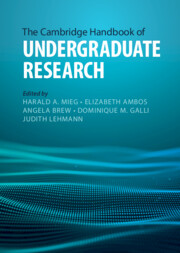Book contents
- The Cambridge Handbook of Undergraduate Research
- The Cambridge Handbook of Undergraduate Research
- Copyright page
- Contents
- Figures
- Tables
- Contributors
- Foreword
- Foreword
- 1 Introduction
- Part I Theory and Research on Undergraduate Research
- Part II Implementation, Approaches, Methods
- Part III Disciplines
- 17 Introduction
- Part III.1 STEM
- Part III.2 Health
- Part III.3 Social Sciences
- 28 Undergraduate Research in Sociology
- 29 Undergraduate Research in Psychology
- 30 Undergraduate Research in Economics
- 31 Undergraduate Research in Political Science
- Part III.4 Humanities
- Part III.5 Arts & Design
- Part III.6 Disciplines A–Z
- Part IV International Perspective
- Part V Avenues for Developing Undergraduate Research
- Index
- References
29 - Undergraduate Research in Psychology
Learning by Doing
from Part III.3 - Social Sciences
Published online by Cambridge University Press: 11 August 2022
- The Cambridge Handbook of Undergraduate Research
- The Cambridge Handbook of Undergraduate Research
- Copyright page
- Contents
- Figures
- Tables
- Contributors
- Foreword
- Foreword
- 1 Introduction
- Part I Theory and Research on Undergraduate Research
- Part II Implementation, Approaches, Methods
- Part III Disciplines
- 17 Introduction
- Part III.1 STEM
- Part III.2 Health
- Part III.3 Social Sciences
- 28 Undergraduate Research in Sociology
- 29 Undergraduate Research in Psychology
- 30 Undergraduate Research in Economics
- 31 Undergraduate Research in Political Science
- Part III.4 Humanities
- Part III.5 Arts & Design
- Part III.6 Disciplines A–Z
- Part IV International Perspective
- Part V Avenues for Developing Undergraduate Research
- Index
- References
Summary
In many undergraduate psychology programs, students gain research experience through intentional scaffolded experiences throughout the undergraduate curriculum and in some cases by joining a faculty member’s research program outside of the classroom. In sustained undergraduate research experiences, students benefit from developmentally appropriate mentoring as they gradually develop and master skills, an approach often compared to an apprenticeship model. Many psychology faculty use evidence-based mentoring practices, such as the Salient Practices Framework, which was developed by an international, multi-institutional research team. Examples include setting clear and incremental expectations and supporting students as they transfer more basic skills learned in the classroom to conducting community or field-based research. There are creative and evidence-based ways to improve access for all students by being more intentional about embedding research experiences in the psychology curricula, or by further considering ways to recruit and retain UR students from historically underserved groups.
Keywords
- Type
- Chapter
- Information
- The Cambridge Handbook of Undergraduate Research , pp. 285 - 292Publisher: Cambridge University PressPrint publication year: 2022



